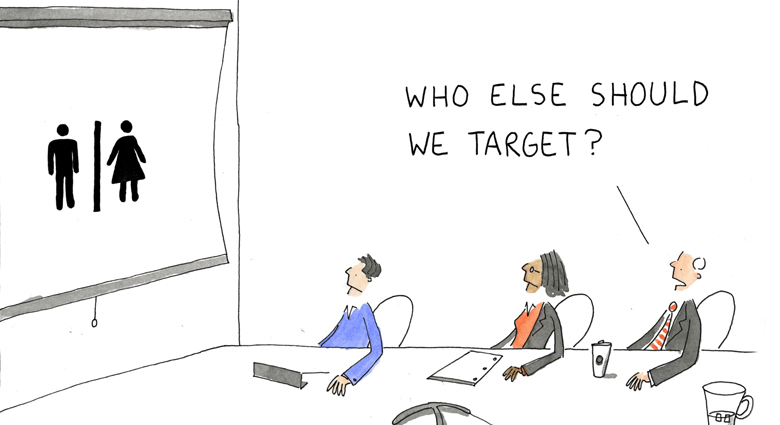It is such a cliché to say that the web has radically transformed companies, and indeed entire industries. Yet I believe that the greatest transformation is our ability to find audiences, influence them about our proposition to them is still ahead of us. Marketing is going to undergo a massive transformation and unless you prepare you company for it today, your future as a profitable entity will be in jeopardy.
I’ve had the privilege of working with some of the largest companies around the planet. With that experience in mind, and as an active digital citizen, I’ve developed 7 rules for digital revolutionaries that if followed will future proof your business. I hope they’ll motivate you to create a veritable primordial ooze from which new ideas (or indeed life) will spark for an imaginative digital existence.
Understand the true strength of each channel & then engaging uniquely with your audience
#1 Multiplicity: Competencies, Campaigns, Systems, Everything.
For far too long we've been able to be successful by relying on our sheer strength on one thing. Catalog. Paid search. YouTube. Billboards. TV. You can no longer be good at just one thing, or two. It is a 10-thing world now (and maybe a 20-thing world soon).
If you are a catalog company you have to be good at catalog marketing (as long as it continues to provide incremental revenue ), and you have to be good at NASCAR (as long as it provides incremental revenue), and you have to be good at Facebook, and you have to be good at email, and search, and YouTube and… a hundred other things. All while constantly optimizing your portfolio via controlled experiments .
You have to be good at sourcing your products and you have to be good at delivering them.
You have to be good on every device of every screen size in every country with a monetizable audience.
It is hard to rewire the company's DNA to truly execute a multiplicity strategy. That's why you allocate 15% of your Marketing budget to getting good at multiplicity. All the time.
#2 One-trick ponies are going to be a liability.
Increasingly, your people can't be one-trick ponies. Especially not people you consider stars.
The web demands immense agility and flexibility from every company. Having one-trick ponies can limit your capacity to think smart and move fast.
If your Marketer is not savvy in basic finance and analytics and writing some html and creating mobile campaigns and tag clouds then you have a long term liability on your hands, and not an asset who is really, really, really, really good at writing copy for display campaigns.
If you have a Finance person for your web business who has never run campaigns on Facebook, and who doesn't understand the uniqueness of mobile applications, and a little bit about the insanity of ad exchanges then over time try to hire someone who does.
At one time, it was okay to be 100% good at one thing, and only one thing. But today companies with people who are 70% magnificent at one thing and have filled the remaining 30% with being good at everything in the periphery of their jobs will rule this world.
Change HR hiring practices now to nurture such 70/30 people inside your company, and to make that a mandatory condition for all new hires. Then you'll rule this world.
#3 Attention is the most precious commodity.
We live in a hyper fragmented world with, quite literally, hundreds of TV channels, thousands of social connections and millions of websites. The single biggest gift any brand can get is attention.
Attention results from understanding the true strength of each channel and then engaging uniquely with your audience. Here's a good example. I bike ride a lot. I walk a lot. In general, I'm a big fan of exercise. I would follow Gatorade on Twitter with the exercise connection of that brand. But you know what they do on Twitter? They retweet other people’s tweets about them. The lamest thing you can imagine using Twitter for.
How could Gatorade have my attention? With a Twitter stream about hydration. If their tweets supported their bio on Twitter: "Helping athletes get the most out of their bodies before, during and after activity." I could not find a single tweet of the 400 I reviewed that fell in that category. Why not try that? Why not go for grabbing my attention and then keeping it? Why not go from trying to have a Gatorade ad on every TV sports event in the hopes that I'm watching to doing that plus doing social media right and have a direct relationship with me?
Not one or the other. Both done exceptionally well. That's how you earn attention.
What is your business shooting for online when it comes to digital marketing? What are you doing to earn, and keep, attention?
#4 Brand destruction is insanely efficient now. Beware!
United breaks guitars. Kenneth Cole goes too far with Egyptian protests. Gap logo. Bank of America everything. You can add 100 more examples in 100 seconds.
Those are big ones. But there are small ones too. I told 20 people that Nikon's site is slow and profoundly sub-optimal on mobile. (Guess what I had on hand when I saw their sexy ad on TV? A mobile device!) Now these 20 people will tell others. Small, silent brand destruction.
Yet so few companies have built organizational capabilities with this efficiency in mind. The distance between a story and an audience is six pixels (as my friend Mitch Joel might say). It is ever more important to live your values, walk the talk, deliver what you promise, not say stupid stuff, be real and accessible, and all those delightful things.
You see, the power that can so efficiently destroy your business, is also the power that can boost you to untold heights. And that's marketing money can't buy.
Imagine a better future for your company.
PS: It is no longer optional for you to just create TV ads and not have the most brilliant, engaging and helpful mobile websites. In case you were wondering, the year of the mobile was two years go.
#5 Glory will come to the precious few who are willing to embarrass themselves.
We don't take risk and try things, imaginative (possibly glorious) things, because we believe the price of failure is so high. And it is in the real world. Consider creating a TV commercial or re-packaging a product or trying a new offer. First, it takes a very long time to actually try something (add longer plus infinity for risky things). Second, when you fail, you fail spectacularly. Heads roll. Companies get entrenched in what they know and end up constantly optimizing for what's always worked, meanwhile the world changes and these companies die, albeit slowly.
Now consider the web. You can have your most embarrassing idea for a redesign/new offer/product launch/whatever out there in one day. AND you can control for risk! You can only show the redesign to 1% of the site traffic. You can try the offer with just one affiliate or some Bing ads. You can launch the product to a selected group of opted-in customers (or only to people in New York). You can literally control for risk should everything blow up in your face. AND you can have analysis of your risk in almost real time to get an early read and in a few days with statistical significance!
You have to be good on every device/every screen size in every country
If you are an executive, encourage your company to check its old world thinking at the door. Consider rewarding people with new ideas. Allocate some of your aforementioned 15% budget to experimentation and testing. If you are a large company don't live without someone with strong Design of Experiments skills.
If you can't embarrass yourself, in controlled quantities, you can't become magnificent. And you can't future-proof your company.
Five simple rules for digital revolutionaries to follow in order to unlock the imagination of their companies and be massively successful in the future. Absorb them. Undertake the very hard task of slowly evolving your company to adapt to them. Monetize the opportunity presented, future-proof your company.
I wish you all the very best.





.png)




What Did You Think?